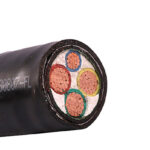What are the differences between YJV3+2 and YJV4+1 cables?
The YJV power cable is composed of one or several soft wires, and the outer covering is covered with a light soft sheath; the cable is composed of one or several insulated wires, and the outside is covered with a tough outer layer made of metal or rubber. As we all know, there are single-core … Read more


